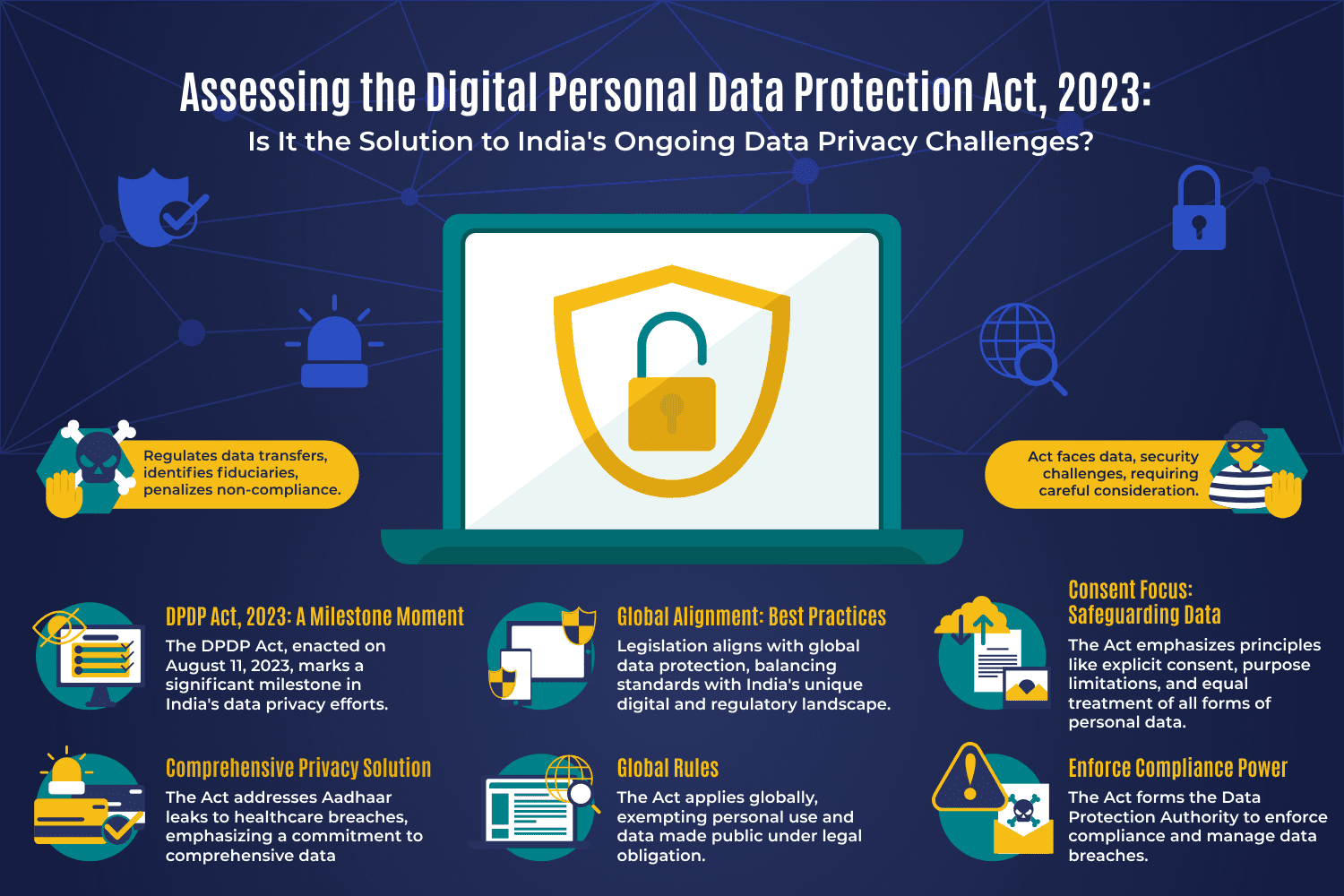India has had a fair share of data privacy issues for quite some time, and the absence of a comprehensive data protection regime has made the country a ground for various privacy breaches and cyberattacks. These challenges have exposed the vulnerabilities within India’s digital ecosystem and underscored the urgent need for robust data privacy measures. Privacy breaches have become alarmingly common in India, affecting individuals and organizations across various sectors, with examples such as the Aadhaar data leak during 2018, when reports emerged of Aadhaar data being leaked, sold, or misused, and healthcare data breaches during the COVID- 19 outbreak, when confidential and sensitive data of patients’ were exposed. The lack of a comprehensive data protection regime has resulted in regulatory uncertainty, inadequate enforcement, and challenges related to cross-border data transfers.
11 August 2023, marks a significant milestone in the nation’s ongoing efforts to address and mitigate data privacy issues, as the Digital Personal Data Protection Act finally received the assent from the President of India. This landmark legislation is poised to play a pivotal role in safeguarding the privacy and security of personal data, taking a comprehensive and holistic approach to tackle the challenges that India has confronted, and continues to face, in the realm of data protection.
The Digital Personal Data Protection Act, 2023, (DPDP Act) represents a concerted effort by the Indian government to establish a robust legal framework that aligns with global practices while addressing the unique dynamics of the country’s digital and regulatory landscape. Its comprehensive nature signifies a commitment to addressing various facets of data privacy comprehensively, ranging from consent mechanisms and data localization to stringent enforcement mechanisms.
Some key highlights include its application to digital personal data, encompassing both digital and subsequently digitized non-digital data. Notably, it has overseas applicability concerning data processing related to offering goods or services to Indian data principals. Exemptions exist for personal data processed for personal or domestic purposes or data made publicly available by the data principal herself or under legal obligation. The Act further emphasizes data protection principles such as purpose and collection limitations and does not introduce sub-categories of personal data, treating all forms of personal data equally. Emphasis has been given to consent, wherein explicit, informed, and affirmative consent for data processing is required, with the provision for withdrawal. The Act establishes the Data Protection Authority of India, which enforces compliance and handles personal data breaches. It also regulates cross-border data transfers, significant data fiduciaries, and rights of data principals, while penalties are imposed for non-compliance.
While the DPDP Act represents a comprehensive attempt to address data privacy issues and chart a path toward a more secure digital society, a closer examination reveals potential challenges and complexities that merit careful consideration. Its broad data usage scope, lacking specific usage guidelines, could inadvertently permit unrestricted personal data use, potentially enabling ethically questionable practices, like algorithm-driven targeted advertising. Moreover, the Act’s reliance on citizen awareness and engagement, without obligating regulatory authorities to educate citizens or conduct compliance audits, may hinder effective enforcement. The Act’s vague security standards leave room for varying interpretations, raising concerns about inadequate data protection. Inconsistencies with disability rights laws regarding consent create uncertainties, and legal hierarchy ambiguity in Section 38 complicates harmonization with other legislation, potentially leading to conflicting interpretations and legal complexities. Addressing these challenges is essential for the Act’s successful implementation and robust data protection in India.
In conclusion, while the DPDP Act strives to provide a comprehensive framework for data privacy and protection, it is essential to acknowledge the potential issues and complexities that may arise during its implementation. Addressing these challenges effectively will require ongoing vigilance, regular updates to regulations, and a commitment to striking a balance between data protection and the ever-evolving digital landscape.
Major General Sanjeev Jain is the Ex- Head of Infrastructure, Indian Army.
He is currently contributing as a Principal Advisor, TLGS Consulting Group. (https://tlgs.consulting/people/)
Ms. Reshma A R is currently a Manager at TLGS Consulting Group, and is a lawyer who graduated from the National University of Advanced Legal Studies in Kochi.

